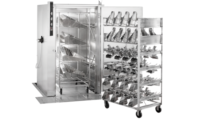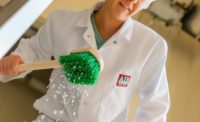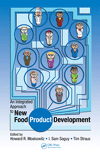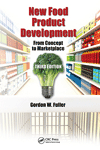As in other areas of the business world, the COVID-19 pandemic has changed the way bakery and snack producers are implementing sanitation strategies and chemicals in the workplace. Many are focusing on all areas of the food processing facility, even entryways, common areas, bathrooms and offices. Many are installing scrubber systems to maintain proper cleaning and sanitizing of boots. Also, many are using shoe bath mats or boot sanitizing systems that spray onto the floor at entrances to production areas prior to an employee entering the area.
Many food processors already had proper cleaning procedures in place to combat most food borne pathogens; however, those procedures were not always followed or the proper chemicals utilized. The difference now is these policies and procedures are being followed, according to Anthony Chaffin, vice president of sales, Global BioProtect, Columbus, OH. “Also, food processors are rethinking their chemical strategies to ensure that the right chemicals are being used in the right areas. They are investing in touchless items such as hands-free towel and soap dispensers along with foot pedals for door entry and exits.”
Most food processors have changed their standard operating procedures to reflect a more thorough sanitation schedule to ensure cleanliness of the plant, according to Patrick T. Casey CP-FS, regional sales manager, Best Sanitizers Inc., Penn Valley, CA. “Also, they are choosing to use quality cleaning and sanitation chemicals that are backed up with the certifications and registrations critical to reducing cross-contamination.”
The chemicals that food processors choose to use in cleaning applications are more important than ever, adds Bradley Sims, Food Division team leader, Madison Chemical Co. Inc., Madison, IN. “You always want to select a product that is going to be effective and compatible with all the surfaces being cleaned, but now you need to look for a product that is classified as effective for destroying SARS-CoV-2. The EPA has created a comprehensive list of these products that companies may choose from.”
Chemicals scrutinized
Beyond the implications of the ongoing pandemic, specific sanitation procedures and chemicals are required for different bakery and snack applications. Within dry processing environments, it is important not to introduce additional moisture to the plant, experts agree. Choosing alcohol-based surface sanitizers is ideal for dry processing environments because they are highly evaporative.
The first thing to do when determining strategies for fried or sticky products versus a dry product is to look closely at the equipment, recognize the different soil types and identify the appropriate cleaning strategy, according to Bob Ogren, vice president of Birko, Henderson, CO. “With something that is fried, for example, you may need a chemical product that is more caustic to take care of the oil during fryer boil-outs or to properly remove the oil that ends up on conveyors. Regarding lines that run both allergen-free and allergen-containing products, you need to have a detailed cleaning program that’s been validated as being effective for removing specific allergens from the equipment and around the facility,” Ogren notes.
The chemicals and procedures needed to clean a specific soil or piece of equipment are going to vary slightly with each application. A fried food operation will require heavy caustics for removal of burnt-on material, and cleaning methods will entail more water use; whereas a baking operation will look to clean with little to no water and the products being used likely need to be formulated for the soft metals common to the industry, according to Sims. “When it comes to allergens, you want to have documented, verified procedures in place for the removal of allergen proteins.”
What are the best procedures for wastewater treatment in bakery and snack plants? Bret Zaher, manager, operations, Americas, AIB International, Manhattan, KS, says wastewater treatment can be difficult to address. Often the equipment is old and has not been updated to handle current production needs. “Many facilities do not have removable strainer baskets in the drains, so the debris goes directly to the treatment plant and clogs the drain. To help control this, new lockable drain covers and strainers require a key to remove the basket.”
When it comes to fryer oils, care should be taken during the cleaning and changeover process. Facility managers must ensure that the oil is being properly filtered to remove as much of the solids as possible prior to discarding it. “New non-corrosive, biodegradable and non-caustic chemicals are available to help remove sugar build-up in drains. Other chemicals that help the drain system contain nonpathogenic bacteria that help dissolve grease, fat and food particles,” Zaher explains.
Among sanitizing products recently introduced to the bakery and snack market, Madison Chemical Co. Inc. offers ProClean, a one-step surface disinfectant and sanitizer designed for hard, non-porous surfaces. Containing no fragrances, bleach, harsh acids or phosphates, it is suitable for a wide range of applications. The company also has introduced Pure-Ox Foam, a foaming detergent with high oxidation potential and the ability to remove tough organic soils. It utilizes the self-foaming characteristics of peroxide. The detergent is chlorine-free, making it non-corrosive to aluminum and stainless steel.
Global BioProtect has introduced BioProtect Multi-Purpose Cleaner, an environmentally safe, biological treatment for the control of odor and rapid removal of fats, grease and oils from surfaces. It features a non-pathogenic and non-toxigenic bacterium that cleans or removes dirt, soil, dust, debris and inanimate solids. The company also offers BioProtect Hydrating Hand Sanitizer, which kills 99.99 percent of germs and bacteria on hands and provides up to six hours of extended hand protection, the company reports. Water-based and alcohol free, it is infused with aloe vera hydration.
Best Sanitizers Inc. offers Alpet D2 Quat-Free Surface Sanitizer, which cleans and sanitizes hard, non-porous surfaces and can be used throughout a food processing plant. It requires no rinse and leaves no residue. It also is highly evaporative and ideal for water-sensitive equipment and dry processing environments. “On pre-cleaned food contact surfaces, including non-porous waterproof gloves, the sanitizer kills 99.999 percent of eight tested pathogens in 60 seconds. It kills 99.9 percent of tested bacteria in 10 seconds on pre-cleaned, non-food contact surfaces, including non-porous waterproof footwear,” says April Zeman-Lowe, national account manager.
Birko has introduced the Mobile Mister portable sanitation system, which uses a non-toxic sanitizer called Peraspray, which kills 99.9 percent of viral pathogens within 10 minutes, thus limiting the spread of viruses. The system includes a hand-held sprayer that produces a fine mist. Nozzles on the top and bottom allow for the sanitization of high and low surfaces simultaneously. It’s small enough to move through tight areas quickly.
Lubricant specifics
Using the right lubricants and lubrication maintenance schedule can extend the life of bakery and snack equipment such as ovens and fryers. Lack or misuse can reduce machine and component life. Best practice is to follow the equipment manufacturer’s lubrication recommendations and make lubrication a priority in a preventative maintenance program, experts agree.
“Recommended lubricants and the maintenance schedule should be used, but there is an opportunity to upgrade to synthetic oil-based lubricants and newer NSF H1 food-grade products, as long as the lubricant’s specification is intact. And then it may be possible to extend re-lubrication intervals,” says W.G. (Bill) Watson, director sales support, Klüber Lubrication NA LP, Londonderry, NH.
Klüber Lubrication recently introduced Kluberfood NH1 74-401 grease for the food market, which utilizes a polyurea thickener. “This, in combination with the synthetic hydrocarbon base oil, provides long-term lubrication intervals at temperatures up to 300 F, thus reducing time spent on maintenance. The product can be used in many bakery applications, and can be dispensed from automatic lubrication systems,” Watson says.
Interflon USA, Swanton, VT, recently introduced the Metal Clean F cleaner, which is completely food safe (NSF H1), according to Otto Oosterwijk, CEO. It serves as a degreasing and cleaning agent for bakery equipment, removing oil, grease and other contaminants from machine parts and leaving behind no residue. The company also offers Food Grease 3H for use throughout the food processing industry, especially in situations where contact with food is unavoidable.
Interflon USA has partnered with Rotalube Systems to offer automatic application of oil to oven chains, a critical application in bakeries because more precise application reduces the amount of oil used. “Less oil means less burning of oil and less harmful residues, resulting in lower production costs and a higher-quality product,” Oosterwijk says.
In addition, Interflon USA is introducing color-coding of lubrication points and product containers to help users determine the right product, frequency and quantity per application. “Reducing human error improves reliability. High-temp and multi-purpose products are typically not miscible, so putting the wrong grease in an application can lead to damage and downtime,” Oosterwijk adds.
Lubriplate Lubricants Co., Newark, NJ, has introduced Lubriplate HTCL-FG-68 and HTCL-FG-220 oven chain lubricants, which are designed for food processing applications where incidental food contact is possible. The Polyol Ester (POE) formula reduces friction, wear and energy costs, the company reports. NSF H1-registered, the lubricants are non-toxic, eliminate carbon build-up on chains, and help maintain a clean, lubricated surface. The company also offers Lubriplate Synxtreme HT MAX grease, which features high-temperature capability (up to 550˚F) and extended lubrication intervals.
Looking to the future, AIB International has created a Pandemic Prepared Certification, the first certification standard created for the food and beverage supply chain, according to Zaher. Certification will help bakery and snack producers address and prepare for pandemic concerns, providing assurance for the supply chain and consumers that the company is committed to establishing and maintaining best practices in sanitation.















